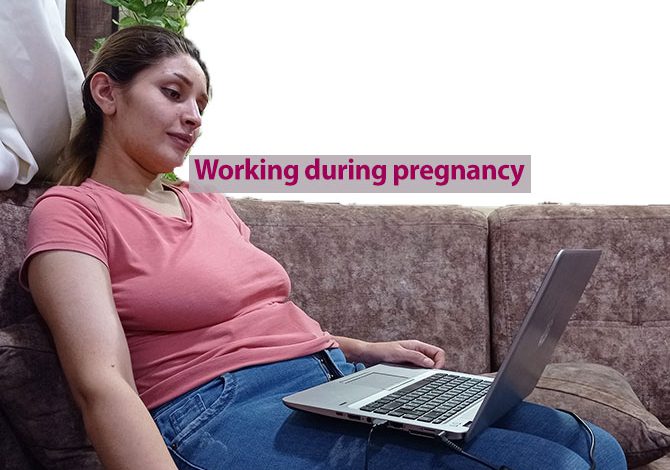Dos and don’ts of working during pregnancy

Working during pregnancy is not always easy. If you are pregnant or you decide to become pregnant and you want to continue your daily activities while pregnant, it is better to familiarize yourself with the methods that maintain the health of the mother and the fetus while doing the work.
There are different opinions about the pregnant mother working during pregnancy. Some women think that when they find out they are pregnant, they have to quit their jobs, and some mothers show up to work until the last day and stop working when they see the signs of labor.
But which one is right? Working during pregnancy has advantages and disadvantages. Sometimes, due to the special conditions of the mother, she is prohibited from working during pregnancy.
Most women can continue to work during pregnancy. But pregnancy can present challenges in the workplace. To stay healthy and active in the workplace, learn how to relieve common pregnancy problems and know when working during pregnancy puts your pregnancy at risk.
Related posts: infertility in women
Relief of nausea and vomiting during work
Nausea during pregnancy is known as “morning sickness”; But it can happen at any moment. To reduce nausea at work:
- Avoid things that trigger nausea: Maybe the pre-pregnancy breakfast you craved every morning or the smell of food heating up in the microwave in the break room can throw off your mood. Avoid anything that makes you nauseous.
- Snack in short intervals: When you feel nauseous, biscuits and other sugary treats are your go-tos. Keep a package of these foods at work for easy access. Ginger drinks or tea is also effective.
Since the body is working overtime to get through the pregnancy, you may feel tired and find it difficult to rest at work.
The following tips may be helpful:
- Eating foods rich in iron and protein: fatigue can be a sign of iron deficiency anemia, But adjusting your diet will help you. Eat foods like red meat, poultry, seafood, vegetables, iron-fortified whole grains, and beans.
- Intermittent short breaks: You can get up for a few minutes and walk a little to find new energy. Also, if you turn off the lights for a few minutes, close your eyes, and stretch your legs up, you will help renew your energy.
- Drink fluids: Keep a bottle of water on your desk and drink from it throughout the day.
- Reduce activity: reducing activity after the end of the workday will help you rest more. You can do your shopping online or hire someone to clean your house and yard.
- Have a fitness routine: Although exercise may be the last thing on your mind after a long day, physical activity and exercise during pregnancy can help boost your energy levels (especially if you’ve been sitting at a desk all day). With the approval and guidance of a specialist doctor, take a walk after work or join a pregnancy fitness class.
- Go to bed early: Aim for at least eight hours of full sleep. Sleeping on the left side maximizes blood flow to the fetus and reduces swelling. For more comfort, put a pillow between your legs and under your stomach.
Consider your convenience
As the pregnancy progresses, it becomes more difficult to perform daily activities such as sitting and standing. Do you remember that we mentioned short and intermittent breaks in the previous section? You can move every few hours while resting to reduce the pressure and contraction of the muscles and prevent the legs and hands from swelling due to the accumulation of fluids.
You can also try the following :
- Sitting: Using a comfortable chair that protects your back well is a good choice. Especially, by changing your weight and posture, it will make you more comfortable sitting for a long time. If you don’t have a comfortable chair, use a small pillow or cushion to cover your back. Prevent swelling by placing a pillow under the foot.
- Standing: If you have to stand for long hours, put one of your feet on a footstool, stool, or box. Change your feet and rest once in a while. Wear comfortable shoes that have a proper arch. You can use support and a gun.
- Bending and lifting: Even when you’re trying to lift a light object, proper posture will help prevent back injury. When bending, bend from the knees, not the waist. Keep the pressure close to the body and on the legs, not the back. Do not swing your body when lifting.
The right way to work during pregnancy
stress control
The stress of work takes away the necessary energy that you should put into taking care of yourself and your baby.
In order to minimize stress and work pressure:
- Talk about work pressure: Share your feelings of exhaustion with a colleague, friend, or loved one.
- Keep calm: Try relaxation techniques like counting your breaths or imagining yourself in a quiet place. Try a yoga class with your doctor’s approval.
- Necessary measures and observance of precautions when working during pregnancy
In some working conditions, the risk of problems during pregnancy increases (especially if you are at risk of premature birth, this matter is important). For example:
- Exposure to harmful substances
- Prolonged standing
- Lifting, climbing, or carrying heavy objects
- loud noises
- Heavy vibration, like big cars
- High temperature
If you are concerned about any of the above, talk to a professional. Together, you will decide whether it is necessary to observe the necessary precautions or whether you need to change your work duties while working during pregnancy.
Which Work Should I avoid during pregnancy?
How many hours should a pregnant woman work?
Can working while pregnant hurt your baby?
What week is best to stop working during pregnancy?
last word
If you stop working shortly after pregnancy, you have more time to focus on your child. Also, you don’t have to deal with workplace stress, especially if you have a stressful job. However, losing a job early in pregnancy can also cause tension. Because it may cause financial problems for the couple.
Working during pregnancy is a choice. As long as you have no problem, you can continue to work. Many women prefer to work during pregnancy because the mind gets involved in work issues and it is easier to spend during pregnancy. But you have to be careful about work pressure.
